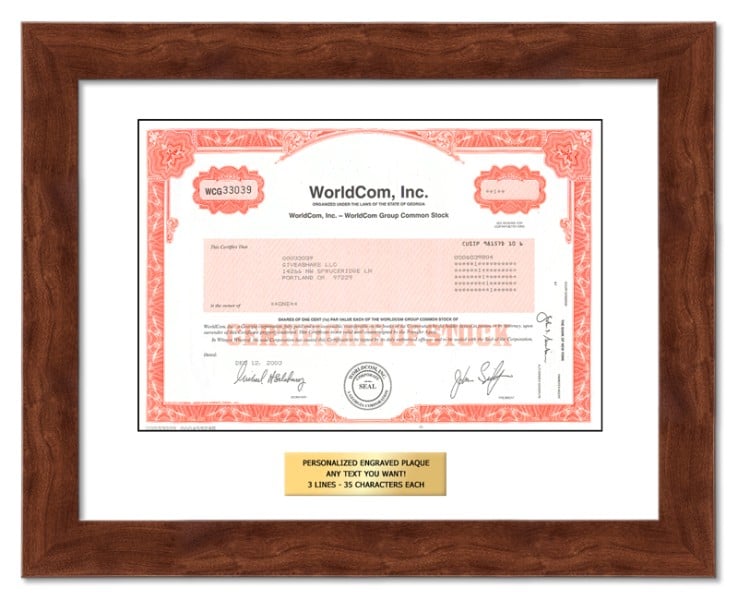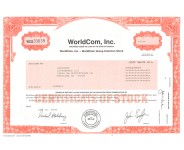Historic collectible stock certificate.
Pre-bankruptcy stock certificate. While supplies last, you can buy an authentic WorldCom stock certificate, a snapshot of the largest bankruptcy in world history - a true collectible!
A limited number of shares were registered in our company name (on certificate) before the company went bankrupt. IMPORTANT: Shares are NOT registered in your name.
WorldCom was a telecommunications company that experienced one of the most significant corporate scandals in history. The failure of WorldCom, which came to light in 2002, was a result of massive accounting fraud and financial mismanagement. Here's a brief overview of the WorldCom scandal:
- WorldCom Inc.: WorldCom was an American telecommunications company founded in 1983, and it grew rapidly through a series of acquisitions during the 1990s. By the late 1990s, it had become one of the largest telecommunications companies in the United States, providing services such as long-distance calling, internet access, and data services.
- Accounting Fraud: As the telecommunications industry faced challenges due to the bursting of the dot-com bubble and a decline in demand for its services, WorldCom's financial performance began to weaken. To conceal its declining profits and inflated expenses, the company engaged in systematic accounting fraud.
- Overstating Earnings: WorldCom's executives, led by CEO Bernard Ebbers and CFO Scott Sullivan, used various accounting tricks to inflate the company's earnings and hide its mounting debts. They classified regular operating expenses as capital investments, which allowed them to spread the costs over several years rather than recording them in the current period.
- SEC Investigation: In June 2002, Cynthia Cooper, WorldCom's Vice President of Internal Audit, uncovered the fraudulent accounting practices while investigating a suspicious entry. She and her team discovered that the company had improperly booked around $3.8 billion in expenses as capital expenditures.
- Bankruptcy: As the scale of the accounting fraud became evident, WorldCom's stock price collapsed, and the company faced imminent bankruptcy. In July 2002, WorldCom filed for Chapter 11 bankruptcy protection, which was then the largest such filing in U.S. history.
- Fallout and Convictions: The revelation of the WorldCom scandal sent shockwaves through the financial world and further eroded public trust in corporate America. The Securities and Exchange Commission (SEC) and other regulatory bodies investigated the fraud, and several executives, including CEO Bernard Ebbers and CFO Scott Sullivan, were eventually found guilty of fraud, conspiracy, and filing false documents with the SEC.
- Rebranding as MCI: After emerging from bankruptcy in 2004, the company rebranded itself as MCI, the name of a telecommunications company it had acquired before the scandal. In 2006, Verizon Communications acquired MCI.
The WorldCom scandal remains a significant example of corporate fraud and its consequences. It led to increased scrutiny of corporate governance, accounting practices, and the role of auditors in ensuring financial transparency and accuracy. The Sarbanes-Oxley Act was enacted in 2002 in response to the scandal, aiming to improve corporate accountability and transparency.

About WorldCom
Because of the WorldCom bankruptcy, shares are no longer traded. We have a limited number of authentic WorldCom stock certificates registered in our company name - They are REAL one-share certificates that are no longer being traded and are a snapshot of the largest bankruptcy in world history and the corporate corruption of the 1990s.WorldCom Stock Certificate
The WorldCom stock certificate is strikingly classic. It represents a snapshot of history incorporating the company's name, logo, corporate seal, and printed signatures of corporate officers.
WorldCom was a telecommunications company that experienced one of the most significant corporate scandals in history. The failure of WorldCom, which came to light in 2002, was a result of massive accounting fraud and financial mismanagement.




















